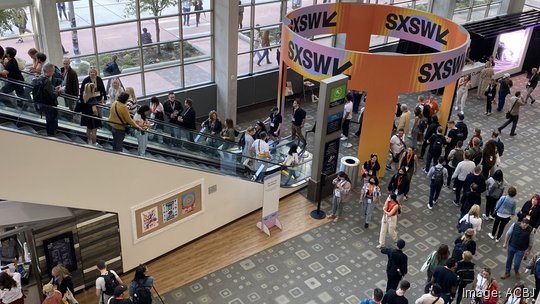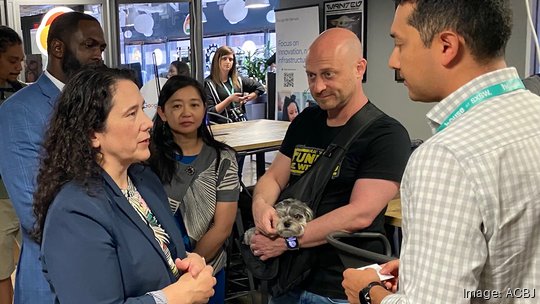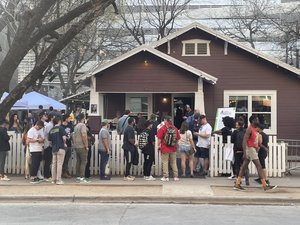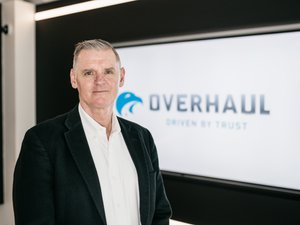
Editor's note: Late Sunday, it was announced that all deposits will be insured by federal officials. Get the latest here.
Craig Cummings knew something was wrong when his phone kept buzzing in his pocket while he was on stage at a Bunker Labs event late last week. When he finally got a moment to return a call to his partner at Austin investment firm Moonshots Capital, Kelly Perdew, Perdew told him that he might be the only one in the world who didn't know what was going on.
He was talking, of course, about the rapid collapse of Silicon Valley Bank. The VCs knew they had to act fast to provide the best intel possible to the startups in Moonshots’ portfolio that had money at SVB (Nasdaq: SIVB), a banking partner for many startups and technology companies that was taken over Friday by the federal regulators.
And before he knew it, they were also advising portfolio companies to consider adjusting holdings at First Republic Bank, which has increasingly been seen as a bank that could follow in SVB's path with customers pulling money out and its stock falling.
"We're saying bigger is better right now," Cummings said Saturday. "Wells Fargo, Bank of America, JPMorgan Chase. And we're not saying you're going to shut down your FRB accounts, for those that are still in FRB. But you may want to move things around, spread the chips around."
While startups and venture capitalists at SXSW are pitching their latest innovations, behind the scenes the quickly evolving SVB crisis, now compounded by concerns about FRB (NYSE: FRC), has become a prevalant conversation, sometimes overshadowing the heaps of attention being given to generative AI.
"I think every founder, every VC, every tech reporter ... our phones are blowing up right now," Cummings said. "And we're just trying to sort through it all. But it's an hour by hour thing right now."
Many startup founders and venture capitalists had similar experiences, with at least a couple of founders and VCs walking off stage in the middle of giving a presentation at SXSW. The fast-unfolding situation couldn’t wait even 10 minutes or half an hour. They had to tells startups to get their money out of SVB and into a safe place as soon as possible.
The implications for startups and other companies with big chunks of money stored at SVB are many. Some may not be able to pay employees on time. Others might have to tell clients to hold off on making payments, and others may not be able to pay vendor bills.
Deposits up to $250,000 are fully covered by Federal Deposit Insurance Corp. insurance, but that won't be enough runway for many companies, especially those that are series A and beyond.
Given SVB's role as the primary banker for the startup world and venture industry, many customers had a lot more than $250,000 deposited. Those larger customers with uninsured deposits will have to wait to find out how much and when their funds may be restored. A lot will depend on whether and how quickly the FDIC will be able to sell SVB's assets or find another bank to take over SVB's operations. The Federal Reserve has scheduled a behind-closed-doors meeting for Monday.
In the meantime, such customers will get "receivership certificates" for amounts they had on deposit that were in excess of $250,000.
Across interviews with several founders and venture capitalists at SXSW, a couple of themes emerged.
Virtually everyone with close financial ties to the bank is feeling a lot of uncertainty and no one knows what might happen even a day or two from now. Meanwhile, nearly all called the bank’s failure a mess or something laced with more expletives.

Capital Factory co-founder Joshua Baer said that many of the early-stage companies that are backed by the local accelerator and its venture funds are too small to be banking with SVB. The bank, he and others said, tended to work with companies that had raised a series A round or beyond — generally those with more than $5 million in the bank.
But that the situation is still creating turmoil.
"It's a really big deal. And, quite frankly, I certainly don't think I know, and I don't think most people either know, or understand what the full implications of it are," Baer said.
"I've gotten lots and lots of emails, like 'We don't have any money with SVB.' 'We do have money wit SVB.' We've got a short list ... of companies we know are having issues. But those are the ones that are the older, more mature companies that have been here for a while — that are able to have $10 million or $20 million in the bank."
Meanwhile, Garry Tan, president and CEO of Y Combinator, tweeted Friday: "This is an extinction level event for startups and will set startups and innovation back by 10 years or more. All little startups, tomorrow's Googles and Facebooks, will be extinguished if we don’t find a fix."
Beth White, founder and CEO of MeBeBot, an Austin startup that has developed an AI assistant for human resources, said her company was able to open another bank account Friday.
"We’re actually not sure if they were able to actually transfer any funds yet," she said Friday evening. "Everything is just still pending. Fortunately, we processed payroll earlier, and we had to contact some of our customers to let them know not to send us a payment right now. And we're not sure if it would have gone through anyway.
"But we are looking at the broader scope of the picture," she added. "Some of our customers may be impacted, some of the companies that we may be selling to in the prospect cycle may be impacted. I really feel for a lot of the companies that may have just gotten their big (fund) raise because if they were already anticipating and starting the hiring process, that's a really scary situation to be in right now."
Small Business Administration Administrator Isabella Casillas Guzman, who toured Capital Factory on Saturday afternoon, said her agency will provide capital and revenue growth opportunities to make sure startups and other small businesses have access to the federal marketplace or global markets abroad.
In a brief interview with Inno, she acknowledged the uncertainty many startups are experiencing. And she sought to assure businesses that the federal government is watching the situation closely.
"I think what people should know and be assured is that our federal regulators have the tools ... we've been through this before," she said.
Gordon Daugherty, co-founder of Capital Factory, shared his personal views of the situation on Twitter Saturday morning.
"Fundraising founders will quickly learn that VCs are now spending 98% of their time assessing the recent impact to their existing portfolio companies, and the likely need to shore up their newly-opened bank accounts until things settle," he tweeted. "If eventual cash recovery from startups’ SVB accounts is only 70% (for example), and especially if the recovery timeline remains unknown for a while, those same VCs will remain hugely distracted for months+. Making investments into new companies will be VERY challenged."
Meanwhile, it's unclear who might swoop in to buy or rescue the bank. A lot of conversations focused on how quickly SVB customers might be able to recover assets, and what percentage of that money might be recouped should a big bank or wealthy buyer make a move in coming days.
"Since most startups forecast their cash fume date in months or quarters," Daugherty wrote, referring to the date when a company expects to run out of cash, "the difference between 70%, 80% and 90% recovery for SVB customers is huge."
Joe Lonsdale, founder of Austin-based 8VC, which is one of the largest investment firms in Texas, said in a tweet that neither he nor his firm kept assets at SVB.
"But something like 40% of tech startups had deposits with SVB, and the best outcome is that FDIC makes sure to cover all or nearly all the deposits with these asset sales. If needed, a small % loss to depositors would teach an important lesson about risk control. Capitalism needs consequences.
"But major deposit losses or a situation that locks up $$ for months for tens of thousands of promising US startups would be terrible for our economy and other banks, and should be avoided," Lonsdale added.







